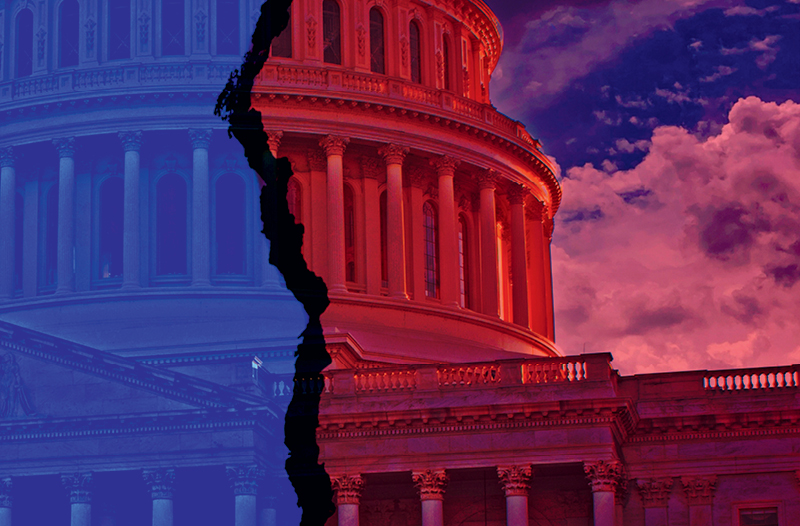
The Great Divide

Nate Silver, the statistician who famously predicted the specifics of the 2008 and 2012 elections, has written much about how we can distinguish true signals from a universe of noisy data.
“Most predictions fail, often at great cost to society, because most of us have a poor understanding of probability and uncertainty,” Silver says. “If our appreciation of uncertainty improves, our predictions can get better too. This is the ‘prediction paradox’: The more humility we have about our ability to make predictions, the more successful we can be in planning for the future.”
As the chief lobbyist for The Council for the past 23 years, I approach the task of predicting the future for the commercial insurance industry based on this fall’s election results with plenty of humility—specifically, fear of humiliation that my predictions will be laughingly read back to me in just a few months. But having worked on and around Capitol Hill for more than 30 years, I’d like to think I have a bit of command of probability. Can I distinguish the predictable from the unpredictable? I do notice thousands of little details that can hopefully lead me closer to the truth, so perhaps I can, as Silver says, “distinguish the signal from the noise.”
Or maybe not. My own biases get in the way.
While I work both sides of the aisle and am grateful for many friendships across the political spectrum, I’m a Republican who wants to see a GOP takeover of the Senate. I want to see dysfunction replaced with good results. I’m so broker-centric in my legislative mentality that perhaps I miss the big picture. But enough with the hedging. Let’s flash forward. The election is over. Here’s the deal:
Severe Forecast
It’s Monday, January 5, 2015. Freshly re-elected Sen. Mitch McConnell of Kentucky, installed as the majority leader replacing Harry Reid, pledges an overhaul of the Senate. He simultaneously vows to take up scores of House GOP-passed measures and force a series of presidential vetoes while also pledging greater bipartisanship by allowing Democrats to freely offer amendments. (Reid rarely allowed Republican alternatives to be debated and voted upon.) McConnell will seize upon precedent and leave the old filibuster rules on the sidelines, clearing the way for a bare majority in the worst case to move bills through conference and to the White House.
McConnell has running room. Republicans needed six seats to gain control but instead won a historic nine-seat gain reflecting the “six-year itch” of an electorate tiring of a two-term president. Sen. Angus King, I-Maine, and Sen. Joe Manchin, D-W.Va., decide to switch to caucus with Republicans, giving McConnell an even more comfortable majority.
House Speaker John Boehner, R-Ohio, himself emboldened by an expanded majority (a GOP pickup of 12 seats), knows this will be his last term and is legacy-minded. President Obama, in an attempt to relive the Clinton-era “triangulation” that balanced budgets and achieved welfare reform, reaches out to Boehner in an effort to revisit their almost-kinda-sorta $5 trillion fiscal deal from 2010 (it collapsed that year amid much acrimony). McConnell, too, is thinking about legacy and indicates his openness for a Grand Compromise tax bill—proof that he represents governance and not partisanship.
Sen. Orrin Hatch, R-Utah, newly installed as chairman of the Finance Committee, puts the employee benefits community on edge. He and committee ranking minority member Ron Wyden, D-Ore., may be polar opposites on most tax issues, but they are willing to take a whack at the “employer/employee exception” from taxation on health plans. The only way this happens is through comprehensive tax reform, and suddenly, for about six months (until the 2016 presidential election gridlocks the Capitol), it looks possible.
Hatch buys into the conservative mantra that consumers, not employers, will ultimately drive down health insurance costs. On the other side, the administration, embarrassed by 2015 premium increases in the state and federal exchanges, is betting the Affordable Care Act “marketplaces” will grow as more employers dump their plans. Taxing benefits raises a lot of money and potentially achieves that goal.
The president even shows some leg on Obamacare changes in the context of the Grand Compromise. It will fall well short of the repeal demanded by conservatives, but he allows tinkering with the individual and employer mandate and is willing to accept repeal of the universally reviled medical device tax. Health carriers are spooked. Not only do they gain no traction on repeal of the health insurance tax, but Republicans increasingly target the “risk corridors” that are the essential backstop for insurers to protect them from millions of bad risks in the exchanges. Perversely, health insurers—so demonized by the president in the ACA debate—have to depend upon the administration to protect the risk corridors as Republicans increasingly deride them as a “government bailout.”
The property-casualty side of the industry is relieved. By the skin of its teeth, the Terrorism Reinsurance Program was reauthorized for six years at the end of the 113th Congress. Sen. Richard Shelby, R-Ala., is reinstated as chairman of the Senate Banking Committee (it had been eight years since he held the gavel), and he, like his House counterpart, Rep. Jeb Hensarling, R-Texas, has a simple philosophy that smaller government is better.
Like Hatch and Wyden on the Finance Committee, Shelby’s on the other side of the political spectrum from the new ranking minority member on the Banking Committee, Sen. Sherrod Brown, D-Ohio, but both are responsive to the insurance industry on a variety of issues that don’t tend to cut along partisan lines.
Meanwhile, the industry’s agenda shifts to the international side, amid growing fears that European regulators want to impose rigid, bank-like capital standards on insurers. Shelby and Brown are sympathetic to helping insurers, but they split on the issue of any significant changes to the Dodd-Frank law.
The p-c community was fixated on TRIA renewal in 2014 (and brokers won—at long last—enactment of the NARAB multistate nonresident licensure clearinghouse). But in 2015 the focus dramatically shifts to cyber security. Revelations of Russian hacking back in the previous summer cause a flurry of activity. Despite the severity of the attacks, and growing concerns about the compromise of critical infrastructure and cyber terrorism, Congress can’t get its act together. Even the basic questions surrounding committee jurisdiction are completely muddled in both chambers. Banking Committee? Homeland Security? Intelligence? Commerce?
While the Obama administration has worked well with the industry in developing and carefully implementing its cyber “framework,” insurers are increasingly worried in 2015 that Obama will break bad—with voluntary standards for coverage morphing into potential mandates. It’s a tricky spot for the p-c community to navigate—wanting to prod the government for more information sharing on cyber intelligence to facilitate coverage while guarding against government meddling in the Wild Wild West of the cyber insurance marketplace.
So there’s your future.
That’s what we’ll be worried about and what we’ll be working on in 2015. It’s a good bet at least some of this will be dead wrong—perhaps all of it. But I’m betting I’m more right than wrong.
Midterm Power Shift
The first premise of my 2015 prediction, of course, is that Republicans will have a good November 2014. Even The New York Times keeps reporting a very high probability that the GOP will retake the Senate and will maintain control of the House. Sen. Jerry Moran, R-Kan., who heads the National Republican Senatorial Committee, making him the point man for the effort to retake the Senate, would agree.
“This class of GOP Senate candidates is the strongest we’ve had in decades—if not ever,” Moran said in August. On this point, I agree.
“These are candidates who are capable of winning,” he continued, “not just in red states like Arkansas and Montana but in purple states like Colorado and Iowa and in blue states like Oregon and Minnesota. It is entirely possible that Republicans can pick up 10 to 14 seats this cycle should we run the table.”
OK, that’s getting a little enthusiastic.
Assuming Republican gains, what will the party do? Everyone in my business agrees there will be a narrow window, perhaps six months, in which Obama and GOP leaders in both chambers can work out big deals. Nobody agrees on the contours of what those deals might look like.
The chasm between the “establishment” Republicans and the Tea Party conservatives will remain. Another question is whether Obama would seriously seek out a legacy deal with Republicans. The comparisons with Bill Clinton may be severely off base.
California-based GOP political consultant Mike Murphy believes it would be disastrous for Republicans to stay in campaign, not governance, mode. (We at The Council are big Murphy fans; we hired his firm to do communications work for us during the Eliot Spitzer broker compensation inquisition.)
In an August appearance on “Meet the Press,” Murphy said he believed Republicans would have a great November. “But the question is, we’re not going to win enough at the elections to govern,” he said. “We’re still going to have a Democrat in the White House. And the next two years for the Republican Party, assuming we win the Senate, are going to be a test. Do we use the double majority in both houses to do something and get some things done? Or do we just continue to pound away in kind of a campaign mentality?
“Long term, looking at 2016, the Senate map is bad, not good for Republicans,” Murphy said. “We’d like to hold any majority we win, and the presidential race has even more of a headwind demographically than ever. So by staying in campaign mode, we’re playing with nitroglycerin here. This is very dangerous stuff.”
Indeed. Not only are there big forces at play here, but there are specific, critical assumptions.
Senate Majority Leader
Perhaps the most important of these is the re-election of Mitch McConnell. Everyone, McConnell most of all, agrees he’s in a dogfight against Kentucky Secretary of State Alison Grimes, making him the most endangered Republican incumbent. More than $100 million is going to be spent on the race—a staggering amount for a state the size of Kentucky. As a McConnell loyalist, I don’t even want to contemplate his defeat.
But it is possible he loses and Republicans still take control of the Senate. Who, then, would take his spot in leadership? The favorite would be the next guy in line, Sen. John Cornyn, R-Texas, a great, smart and respected guy. But there’s been speculation he could be challenged by Sen. John Thune, R-S.D. He is a Reagan-esque figure who may be the most perfect bridge from the establishment conservative to the Tea Party conservative wings of the party. (Thune’s daughter, Brittany Lindberg, runs CouncilPAC, so we have a bias here.) Even though they’re all conservative Republicans, any of those three scenarios—involving McConnell, Cornyn and Thune—could move the party, and thus Congress, in significantly different directions.
Mr. Speaker
The other assumption here is that John Boehner will remain Speaker of the House. He will certainly win re-election this fall, and he is perceived by his caucus as being in a much stronger political position than he was a year ago. Perversely, the primary loss of Majority Leader Eric Cantor works to Boehner’s advantage. Cantor had been an on-again, off-again rival of Boehner’s, and the leadership shuffle that occurred in the aftermath of the Cantor loss worked to Boehner’s advantage.
Conservatives elevated Majority Whip Kevin McCarthy, R-Cal., to Majority Leader, and elected Steve Scalise, R-La., as their number three. At least in the early going, the new team seems energized with Boehner clearly running the show.
But Boehner’s not a feet-first guy. He’s not power-mad, and he envisions a life beyond Congress. Will he stick around? Whatever he decides, I believe it will be on his own terms—not because he’s forced into any position. Much has been made in recent years about the “Hastert Rule,” which holds that any votes in the House must be won with a majority of the majority. Boehner violated the rule to keep the government open and survived it despite conservative handwringing.
But he has precious little room to negotiate deals with Democrats that can’t garner the full support of his caucus. Perhaps the Grand Compromise on a fiscal deal is his last and only opportunity to violate the Hastert Rule in a legacy-making (or legacy-breaking) way.
Legacy Time
The last wild card is President Obama’s motivation. He will be in his final two years in office, which can be a liberating position to be in. But how willing is he to work out a big tax/spending/policy deal with Republicans if it requires too much compromise on his liberal principles? Will he veer to the middle or to the left?
Republicans are suing the president over his use of executive actions, in particular his ever-changing implementation of Obamacare. If Republicans think he’s been abusive before the midterm election, they could be in for much more exploitation of his executive authority in the final two years.
In the commercial insurance world, our biggest fear is that self-insured plans could be bureaucratically bludgeoned once the administration no longer has to fear political consequences of more Americans losing the health insurance they like. More than 60% of Americans who receive their health coverage through work are in self-insured plans. For most of these, particularly Fortune 1000 companies, they should be relatively secure. But self-insured plans are the ultimate “escape mechanism” from ACA coverage mandates, and the Department of Labor has been kicking the tires of making changes to stop-loss reinsurance in the name of “eliminating loopholes.” This could have wide-ranging consequences.
The assault on employer-provided health insurance will likely continue. If you think Obamacare is an assault on your benefits business, just wait until Congress and the president agree on a deal that taxes health benefits, even if just a little bit. It may well be the gravest threat in the next Congress.
Or it could be that I’m Chicken Little. One of the nastiest elements of my lobbying profession is the “scare ’em and save ’em” consultants. They peddle their services to clients by warning them Congress is about to do something awful to muck up their lives. In a couple of scenarios I’ve witnessed up close, they’ve even stirred up congressional “interest” in an issue just to play out the scenario, get their fat retainer, and then “save ’em” by snuffing out the congressional interference.
Imagine the scenarios. Out of nowhere, the market goes hard and there’s a liability crisis that demands a congressional response. After a couple years of stable health inflation, the market careens and the industry is once again blamed. Obama really is as liberal as most of we conservatives feel and takes the gloves off. A catastrophe—natural or not—occurs and the industry is tainted. A cyber event occurs that makes the Target data breach seem negligible.
When any of that happens, you’re really going to need your lobbyist to save you!
Political risk in D.C. is, I suppose, like any other. Mike McGavick, CEO of XL in Bermuda (and who but me remembers he was the GOP nominee for a Washington state U.S. Senate seat in a lousy Republican year?), is always eloquent, and I’m going to issue my final hedge on his words. You’ll want you to consider his assessment through a political lens: (scribbed from a Reactions interview in August): “I can still remember when we were in the late 1990s. There was much talk that the cycle was over. We were hearing all the same things. Capital was getting so much more efficient, there had been so much consolidation, technology was enabling us to take the cycle out, pricing was more precise. I remember all those phrases. And then 9/11 happens and the whole world’s mentality toward risk shifted overnight. I still think that there are events like that out there and that we don’t know what they are…There are things that happen that we may think are on our register of risk but aren’t. The market doesn’t really believe it and certainly doesn’t price for it. I’m always tempted to think it’s really different now, but I think humans are what they are, and we’re very reactive to unexpected things. Unexpected things are still out there.”
It’s worth repeating: Unexpected things are still out there.




